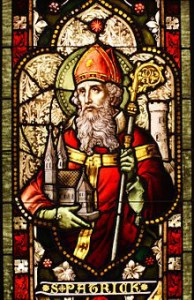catholic holy days
St. Patrick of Ireland
 In America, March 17th is St. Patrick’s Day. Parades are held; Irish food is served; and people adorn green on the threat of being pinched. But who is St. Patrick? And why do we celebrate him?
In America, March 17th is St. Patrick’s Day. Parades are held; Irish food is served; and people adorn green on the threat of being pinched. But who is St. Patrick? And why do we celebrate him?St. Patrick was born in Roman Britain and lived around the fifth century. As a teenager, he was captured by pirates and brought to Ireland as a slave, where he was forced to work as a shepherd. It was during this captivity that St. Patrick had a deep spiritual awakening. In a locution he was told that he needed to escape his slavery. He listened to this voice, snuck away to a seaport, and convinced a captain to take him aboard. Once safely back to Britain, St. Patrick began to study Christianity, and then specifically for the priesthood. He eventually became a Bishop.
Years later, he had a vision that urged him to return to Ireland, the place of his captivity, and free the inhabitants from a deeper type of slavery: sin. He started with himself. Having experienced the mercy of God in his own soul, he forgave his captors, and this enabled him to devote his life to the conversion of the Druids and pagans of Ireland. Though he baptized thousands of persons, he did it at personal risk. At times, he was beaten, robbed, re-enslaved, and threatened with execution by local authorities. more...
Holy Thursday
Holy Thursday is a specific day in the Church’s liturgical calendar commemorating the actions of Jesus Christ on the night before He died. Since, Jesus had foreknowledge of His upcoming death, His last hours particularly show Who He Is and what He wanted to leave behind. These final actions are recorded in the four Gospels: Matthew, Mark, Luke and John. Each sheds light on the final and deliberate moments of Jesus.
St. Luke has no subtlety in expressing what Jesus desired: “I have earnestly wanted to eat the Passover with you before I suffer; for I tell you I shall not eat it until it is fulfilled in the kingdom of God.” (Luke 22:15-16) After the Passover, in the Mount of Olives, the word, earnestly, appears once more: “in agony, He prayed more earnestly; and His sweat became like drops of great blood falling down upon the ground.” (22:44) This phenomena of sweating blood only happens when one is under great duress. If Jesus acted deliberately, why would the Passover be sought anxiously and what later caused such agony in Jesus? more...
2 Item(s)


